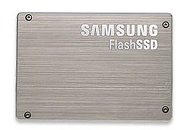- Joined
- Oct 9, 2007
- Messages
- 47,430 (7.51/day)
- Location
- Hyderabad, India
| System Name | RBMK-1000 |
|---|---|
| Processor | AMD Ryzen 7 5700G |
| Motherboard | ASUS ROG Strix B450-E Gaming |
| Cooling | DeepCool Gammax L240 V2 |
| Memory | 2x 8GB G.Skill Sniper X |
| Video Card(s) | Palit GeForce RTX 2080 SUPER GameRock |
| Storage | Western Digital Black NVMe 512GB |
| Display(s) | BenQ 1440p 60 Hz 27-inch |
| Case | Corsair Carbide 100R |
| Audio Device(s) | ASUS SupremeFX S1220A |
| Power Supply | Cooler Master MWE Gold 650W |
| Mouse | ASUS ROG Strix Impact |
| Keyboard | Gamdias Hermes E2 |
| Software | Windows 11 Pro |
Samsung Electronics Co., Ltd., the world leader in advanced semiconductor technology solutions, today introduced the first solid state drive (SSD) utilizing high-performance toggle-mode DDR NAND. The new 512 gigabyte (GB) SSD provides electronic data processing application designers with advanced performance and reliability for notebooks with premium value.
"The highly advanced features and characteristics of our new SSD were obtained as a direct result of an aggressive push for further development of our NAND flash technology, our SSD controller and our supportive SSD firmware," said Dong-Soo Jun, executive vice president, memory marketing, Samsung Electronics. "Early introduction of this state-of-the-art toggle DDR solution will enable Samsung to play a major role in securing faster market acceptance of the new wave of high-end SSD technology," he added.

The new 512GB SSD makes use of a 30 nanometer-class 32 gigabit chip that the company began producing last November. The toggle-mode DDR structure together with the SATA 3.0Gbps interface generates a maximum sequential read speed of 250 Megabyte per second (MBps) and a 220MBps sequential write speed, both of which provide three-fold the performance of a typical hard disk drive. At these speeds, two standard length (apprx. 4GB each) DVD movies can be stored in just a minute.
Samsung provides further gains in power efficiency by having developed a low-power controller specifically for toggle-mode DDR NAND. The resulting power throttling capability enables the drive's high-performance levels without any increase in power consumption over a 40nm-class 16Gb NAND-based 256GB SSD. The controller also analyzes frequency of use and preferences of the user to automatically activate a low-power mode that can extend a notebook's battery life for an hour or more.
The Samsung 512GB SSD makes use of reinforced 256-bit AES (advanced encryption standard) encryption to ensure higher security, protecting personal data against online hackers or undesired access when its host PC is misplaced and lost.
Samsung also provides streamlined boot time and application access with this new SSD, showing an approximately nine-fold improvement in random performance over HDDs. Also, an intelligent operation management function optimizes the SSD's background working environment. Coupled with the popular Windows 7 TRIM feature the operation management function secures the reliability of the drive in write mode.
Samsung plans to begin volume production of the 512GB SSD next month. The new capacity extends Samsung's range of SSD densities from 64GB to 512GB.
View at TechPowerUp Main Site
"The highly advanced features and characteristics of our new SSD were obtained as a direct result of an aggressive push for further development of our NAND flash technology, our SSD controller and our supportive SSD firmware," said Dong-Soo Jun, executive vice president, memory marketing, Samsung Electronics. "Early introduction of this state-of-the-art toggle DDR solution will enable Samsung to play a major role in securing faster market acceptance of the new wave of high-end SSD technology," he added.

The new 512GB SSD makes use of a 30 nanometer-class 32 gigabit chip that the company began producing last November. The toggle-mode DDR structure together with the SATA 3.0Gbps interface generates a maximum sequential read speed of 250 Megabyte per second (MBps) and a 220MBps sequential write speed, both of which provide three-fold the performance of a typical hard disk drive. At these speeds, two standard length (apprx. 4GB each) DVD movies can be stored in just a minute.
Samsung provides further gains in power efficiency by having developed a low-power controller specifically for toggle-mode DDR NAND. The resulting power throttling capability enables the drive's high-performance levels without any increase in power consumption over a 40nm-class 16Gb NAND-based 256GB SSD. The controller also analyzes frequency of use and preferences of the user to automatically activate a low-power mode that can extend a notebook's battery life for an hour or more.
The Samsung 512GB SSD makes use of reinforced 256-bit AES (advanced encryption standard) encryption to ensure higher security, protecting personal data against online hackers or undesired access when its host PC is misplaced and lost.
Samsung also provides streamlined boot time and application access with this new SSD, showing an approximately nine-fold improvement in random performance over HDDs. Also, an intelligent operation management function optimizes the SSD's background working environment. Coupled with the popular Windows 7 TRIM feature the operation management function secures the reliability of the drive in write mode.
Samsung plans to begin volume production of the 512GB SSD next month. The new capacity extends Samsung's range of SSD densities from 64GB to 512GB.
View at TechPowerUp Main Site





